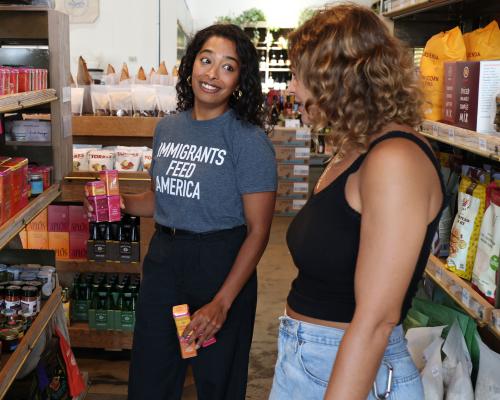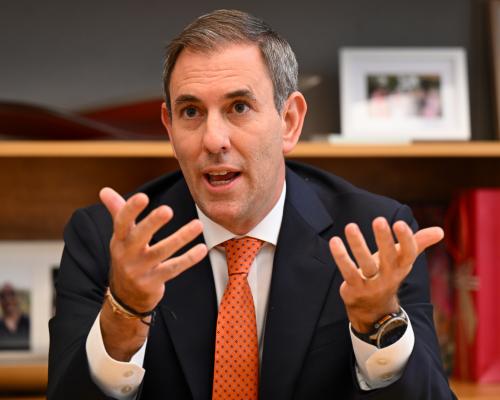
In 2016, turmeric lattes were all the rage, but Sana Javeri Kadri thought the ones in San Francisco, where she lives, tasted nothing like the fresh spices she grew up with in India.
A former line cook who was doing marketing for a Bay Area grocer, Javeri Kadri “knew [her] way around spices”, but was new to the industry. Still, she booked a ticket home to Mumbai, hoping that she could get richer flavors into US pantries.
After reaching out to a number of growers, she met an organic turmeric farmer and, using her tax refund and a loan from her parents, bought a batch of the crop. It became the foundation of Diaspora Co, which Javeri Kadri launched the following year at just 23.
From the outset, Javeri Kadri aimed to bypass industrial spice farms, whose products she found bland, and instead source from farmers using regenerative practices. This meant working directly with the producers and paying them a living wage.
“By rough math, I probably reached out to around 2,500 farmers,” she said.
After two years of growing a US market for her turmeric, Javeri Kadri added black pepper to the mix. For a while after that, it was an “exponential growth curve”, she said.
Today Diaspora Co has 24 employees and sells around 40 different spices and blends, sourced from 140 different farms in India and Sri Lanka.
Diaspora Co is part of a wave of new spice companies, including Burlap & Barrel and Spicewalla, that center sourcing from sustainable farms, paying producers a living wage, building a more transparent (and streamlined) supply chain – steps they say allow them to put noticeably fresher spices on the market.
Javeri Kadri said it was common knowledge in the industry that because of the long supply chains, it can take years for spices to reach consumers, meaning they are “expired before they even get to you”.
She said Diaspora Co farmers rotate their crops, maintain plant diversity and use water-retention systems – regenerative practices that not only minimize the farms’ carbon footprint, but also make them more resilient to climate shocks.
That meant when extreme flooding struck Tamil Nadu, India, last year, Diaspora’s cardamom farm “had such great aerated soil and such good irrigation, they were only in standing water for a few hours before the soil and the property was able to flush itself clean”, minimizing losses, she said.
Javeri Kadri stressed that her partners were already practicing sustainable agriculture before she arrived on the scene, but she connects them with each other. “If you get them talking, they problem-solve themselves,” she said. “They’re all experts.”
Diaspora Co enjoys low worker turnover and lasting partnerships, something Javeri Kadri attributes to the company’s commitment to fair wages. “Once we build a relationship with them, it never goes anywhere,” she said.
In 2022, Diaspora Co launched a fund for farm workers, offering financial literacy workshops and providing seed money to open bank accounts, among other things. At a cardamom farm, workers asked for a community room and kitchen, which Javeri Kadri admitted wasn’t what she expected. But “it’s what they need, not what we think sitting in America that they need,” she said. “Really the point of it is that we listen to the workers directly.”
Franco Fubini, a Diaspora Co board member and founder and CEO of sustainable food sourcing platform Natoora, said Javeri Kadri wasn’t just “trading spices”, she was building a unique supply chain and helping to catalyze demand for products that “are created in harmony with nature”.
He added: “Whenever you have a company that is creating a market by stimulating demand, buying the right product, paying the right price for it, and creating a healthy farming ecosystem – that is what revolutionizing the food system is all about.”
Diaspora’s efforts to, as Javeri Kadri puts it, “decolonize the spice trade” have also proven profitable. She’s raised about $2.5m from angel investors in the last few years, and though she declined to share revenue numbers, she said the company had grown twentyfold over the past five years. Its spices are now sold in 400 US stores, and last year, with help from Natoora, Diaspora Co expanded into the UK.
Rather than pressuring existing partners to produce more and more, which could tax the land (and workers), Javeri Kadri said she plans to keep adding new farm partners in order to continue to boost production.
Javeri Kadri has other projects on the horizon, including a new Masala Chai tea blend, another blend developed with the former Top Chef host Padma Lakshmi, and a cookbook featuring recipes from partner farms. “A lot of people tell me, ‘Oh, Indian food is intimidating or heavy or complicated,’ and the whole premise of the book is, how do we make it as bright and fresh and accessible as possible?” Javeri Kadri said.
She plans to roll out these projects while managing an altogether new challenge: This month, Donald Trump said he would raise tariffs on Indian products to 50%, a move that Javeri Kadri predicts will cost her company between $100,000 and $200,000 by the end of the year, leaving her no choice but to eventually raise prices. (She said they had already paid about $20,000 in tariffs since April, when the US imposed its initial levies.)
Javeri Kadri’s entire business model is built on sourcing spices from the areas they are indigenous to in south Asia, which means she couldn’t pivot her supply chain even if she wanted to.
“People will say, ‘Well, we don’t need those exotic ingredients anyway,’” she said. But, she added, “there’s nothing as American as apple pie. And apple pie relies on cinnamon. An American classic is vanilla ice cream; we don’t grow vanilla. A lot of these ingredients are inherently not exotic, but they come from elsewhere.”
Tariffs could have an especially devastating effect on mission-driven companies like Diaspora, which operate on small margins even as they prioritize single-source farms and fair labor, said David Ortega, the Noel W Stuckman chair in food economics and policy at Michigan State University. “These tariff price increases can really jeopardize those priorities.”
With the higher tariffs – and the economic uncertainty surrounding trade policy – Javeri Kadri acknowledges that it may be hard to grow in the US market over the coming years. Her approach?
“We grow elsewhere. We go where we’re not penalized for doing business,” she said. “It’s very simple.”







